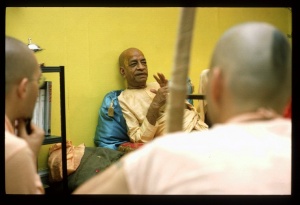SB 7.15.47

A.C. Bhaktivedanta Swami Prabhupada
TEXT 47
- pravṛttaṁ ca nivṛttaṁ ca
- dvi-vidhaṁ karma vaidikam
- āvartate pravṛttena
- nivṛttenāśnute 'mṛtam
SYNONYMS
pravṛttam — inclination for material enjoyment; ca — and; nivṛttam — cessation of material enjoyment; ca — and; dvi-vidham — these two varieties; karma — of activities; vaidikam — recommended in the Vedas; āvartate — one travels up and down through the cycle of saṁsāra; pravṛttena — by an inclination for enjoying material activities; nivṛttena — but by ceasing such activities; aśnute — one enjoys; amṛtam — eternal life.
TRANSLATION
According to the Vedas, there are two kinds of activities-pravṛtti and nivṛtti. Pravṛtti activities involve raising oneself from a lower to a higher condition of materialistic life, whereas nivṛtti means the cessation of material desire. Through pravṛtti activities one suffers from material entanglement, but by nivṛtti activities one is purified and becomes fit to enjoy eternal, blissful life.
PURPORT
As confirmed in Bhagavad-gītā (BG 16.7), pravṛttiṁ ca nivṛttiṁ ca janā na vidur āsurāḥ: the asuras, nondevotees, cannot distinguish between pravṛtti and nivṛtti. Whatever they like they do. Such persons think themselves independent of the strong material nature, and therefore they are irresponsible and do not care to act piously. Indeed, they do not distinguish between pious and impious activity. Bhakti, of course, does not depend on pious or impious activity. As stated in Śrīmad-Bhāgavatam (SB 1.2.6):
sa vai puṁsām paro dharmo
yato bhaktir adhokṣaje
ahaituky apratihatā
yayātmā suprasīdati
"The supreme occupation [dharma] for all humanity is that by which men can attain to loving devotional service unto the transcendent Lord. Such devotional service must be unmotivated and uninterrupted in order to completely satisfy the self." Nonetheless, those who act piously have a better chance to become devotees. As Kṛṣṇa says in Bhagavad-gītā (BG 7.16), catur-vidhā bhajante māṁ janāḥ sukṛtino 'rjuna: "O Arjuna, four kinds of pious men render devotional service unto Me." One who takes to devotional service, even with some material motive, is considered pious, and because he has come to Kṛṣṇa, he will gradually come to the stage of bhakti. Then, like Dhruva Mahārāja, he will refuse to accept any material benediction from the Lord (svāmin kṛtārtho 'smi varaṁ na yāce (CC Madhya 22.42)). Therefore, even if one is materially inclined, one may take to the shelter of the lotus feet of Kṛṣṇa and Balarāma, or Gaura and Nitāi, so that he will very soon be purified of all material desires (kṣipraṁ bhavati dharmātmā śaśvac chāntiṁ nigacchati). As soon as one is freed from inclinations toward pious and impious activities, he becomes a perfect candidate for returning home, back to Godhead.